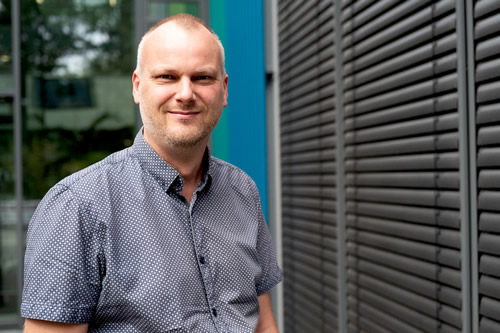 Lars Schäfer and his team use simulations to clarify the structure and dynamics
Lars Schäfer and his team use simulations to clarify the structure and dynamics
of proteins. © RUB, KramerPRESS RELEASE
THEORETICAL CHEMISTRY
Giant nanomachine aids the immune system
A small but important step towards a successful immune reaction is performed by an impressive nanomachine. Researchers use simulations to understand how it works.
28 August 2020- Germany- In order to kill diseased cells, our immune system must first identify them. The so-called peptide-loading complex plays a key role in this process. In collaboration with colleagues from Jülich, a research team at Ruhr-Universität Bochum has analysed this nanomachine in atomic detail. They report their results in the journal Proceedings of the National Academy of Sciences, PNAS for short, from 11. August 2020.
Cells that are infected by a virus or carry a carcinogenic mutation, for example, produce proteins foreign to the body. Antigenic peptides resulting from the degradation of these exogenous proteins inside the cell are loaded by the peptide-loading complex onto so-called major histocompatibility complex molecules (MHC for short) and presented on the cell surface. There, they are specifically identified by T-killer cells, which ultimately leads to the elimination of the infected cells. This is how our immune system defends us against pathogens.
Machine operates with atomic precision
The peptide-loading complex ensures that the MHC molecules are correctly loaded with antigens. “The peptide-loading complex is a biological nanomachine that has to work with atomic precision in order to efficiently protect us against pathogens that cause disease,” says Professor Lars Schäfer, Head of the Molecular Simulation research group at the Centre for Theoretical Chemistry at RUB.
In previous studies, other teams successfully determined the structure of the peptide-loading complex using cryo-electron microscopy, but only with a resolution of about 0.6 to 1.0 nanometres, i.e. not in atomic detail. Based on these experimental data, Schäfer’s research team in collaboration with Professor Gunnar Schröder from Forschungszentrum Jülich has now succeeded in creating an atomic structure of the peptide-loading complex.
Exploring structure and dynamics
“The experimental structure is impressive. But only with our computer-based methods were we able to extract the maximum information content contained in the experimental data,” explains Schröder. The atomic model enabled the researchers to perform detailed molecular dynamics computer simulations of the peptide-loading complex and thus to study not only the structure but also the dynamics of the biological nanomachine.
Since the simulated system is extremely large with its 1.6 million atoms, the computing time at the Leibnitz Supercomputing Centre in Munich aided this task considerably. “Using the high-performance computer, we were able to push into the microsecond time scale in our simulations. This revealed the role of sugar groups bound to the protein for the mechanism of peptide loading, which had previously only been incompletely understood,” outlines Dr. Olivier Fisette, postdoc researcher at the Molecular Simulation research group.
Direct intervention in immune processes
The atomic model of the peptide-loading complex now facilitates further studies. For example, some viruses try to cheat our immune system by selectively switching off certain elements of the peptide-loading complex. “One feasible objective we’d like to pursue is the targeted intervention in these processes,” concludes Schäfer.
Funding
The research was funded by the German Research Foundation as part of the Cluster of Excellence Ruhr Explores Solvation Resolv (EXC 2033).
Original publication
Olivier Fisette, Gunnar F. Schröder, Lars V. Schäfer: Atomistic structure and dynamics of the human MHC-I peptide-loading complex, in: Proceedings of the National Academy of Sciences of the United States of America, 2020, DOI: 10.1073/pnas.2004445117
###
Press contact:
Prof. Dr. Lars Schäfer
Chair of Theoretical Chemistry
Ruhr-Universität Bochum
Germany
Phone: +49 234 32 21582
Email: lars.schaefer@rub.de
Source: https://news.rub.de/english/press-releases/2020-08-28-theoretical-chemistry-giant-nanomachine-aids-immune-system
"Reproduced with permission - Ruhr-Universität Bochum"
Ruhr-Universität Bochum
For more HIV and AIDS News visit...
Positively Positive - Living with HIV/AIDS:
HIV/AIDS News
|